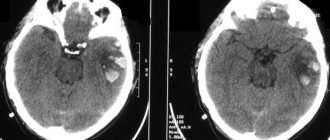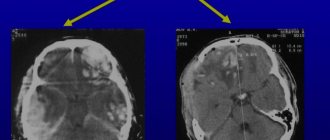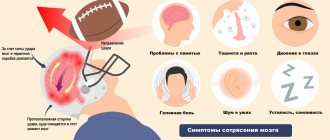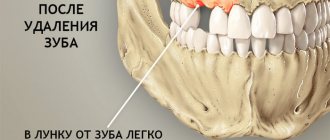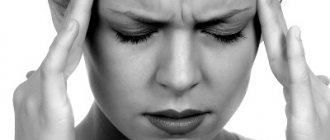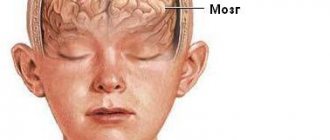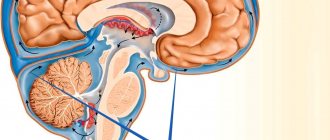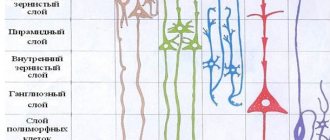A disruption of the normal functioning of the brain, which occurs after a mechanical injury to the skull and is not based on vascular pathologies, is called a concussion. A similar disorder occurs in 60-70% of people who have suffered a head injury in one way or another.
A concussion falls into the category of mild types of TBI (damage to the cranial bones and/or soft tissues, called traumatic brain injury), the most common type in medical practice. It is characterized by the development of general cerebral and/or unstable focal neurological symptoms, which usually pass rather quickly.
Short-term complications of concussion
Some patients who have suffered a concussion may experience so-called post-stress disorders:
- persistent headaches lasting 7-14 days, the intensity of which decreases when taking analgesics or painkillers of other groups;
- attacks of dizziness, difficulty concentrating, difficulty performing any normal activities (reading, writing, etc.);
- periodic vomiting for no apparent reason, feeling of nausea.
Most often, the side effects of a concussion disappear after some time without treatment; if they bother the patient for several months, you should visit a doctor and get an appointment for a consultation with a neurologist or a brain tomography (magnetic resonance, computer) to clarify the diagnosis.
Complications of concussion
Among the consequences of a concussion there are numerous and varied complications. Thus, repeated (repeated) concussions cause a condition called dementia pugilistica, or boxer encephalopathy; This is a form of parkinsonism of a post-traumatic nature, characteristic of people who are professional boxers and periodically experience head injuries. The works of G. Martland, who described this syndrome, indicate characteristic signs of post-traumatic encephalopathy: a slight lag in the movements of one leg or “slaps” of the foot in the early stages, sometimes problems with maintaining balance, staggering; Some patients have a clearly noticeable slowness of action and periodic confusion. Sometimes the manifestations of the disease remain mild; in other cases, dragging of the legs, retardation of movements, specific mental disorders (for example, a decrease in the vocabulary used), trembling of the head and limbs are clearly observed.
Complications resulting from a head injury can be the most severe, so to the question of what to do in case of a concussion, the answer is clear: consult a doctor; after all, a traumatic brain injury of any type and severity can lead to changes in the mental component of the personality and/or physical disorders. Such complications include:
- The occurrence of a specific reaction to drinking alcohol or infection of the body: in a drunken state, with the flu or other infectious disease, the patient experiences confusion (delirium), outbursts of overexcitation and other mental disorders.
- Vasomotor type disorders associated with changes in vascular tone. They usually appear:
- persistent, persistent headaches, the intensity of which sharply increases with physical exertion on the body or simply sudden movements;
- dizziness that occurs during physical effort and tilting the body;
- alternating rushes of blood to the head area and subsequent severe pallor with increased sweating (often such manifestations are asymmetrical and involve one half of the head);
- rapid onset of general fatigue, lack of concentration.
- Uncontrollable outbursts of emotions, increased irritability, a person’s tendency to get excited quickly, easily fly into rage, often with aggression towards others. Quite often, aggressive outbursts are followed by a period of repentance, and the patient sincerely apologizes for his behavior.
- The manifestation of concussion symptoms in the form of seizures, similar to epileptic seizures.
- Acquisition of paranoid qualities by the patient’s personality, as well as neurotic states, when a person is overly nervous about any reason, anxious, and fearful. Patients lose the ability to concentrate, complain of headaches, sleep disturbances; Vasomotor disturbances are present.
More rare complications include psychotic disorders (psychoses), when the patient hallucinates, delusions, and has poor perception of reality. In some cases, mental disorders can lead to dementia - acquired dementia, characterized by serious shifts in thinking, memory, loss of a critical attitude and the ability to navigate the real environment, and apathetic states.
More often than others, according to experts, such consequences of a concussion as a specific post-concussion syndrome occur (the name is derived from the Latin words post - “after” and commotio - “shaking”). It can manifest itself a month or a year after the injury in the form of sharp, difficult-to-bear headaches, attacks of dizziness, restlessness and sleep disturbances, and problems concentrating on any usual activity. Psychotherapeutic treatment of concussion (more precisely, its consequences) in this case is rarely effective; Symptomatic treatment is recommended, but it should be remembered that taking strong painkillers can be more dangerous than the disease itself and cause the development of drug dependence.
Complications of a concussion
There are several consequences of concussion in adults.
Manifestation of short-term disorder
Short-term complications of a concussion are symptoms that accompany the underlying disease in its early stages.
These include:
- weakness,
- headache,
- dizziness,
- syncope,
- diplopia (double vision),
- darkening in the eyes,
- binacular vision impairment,
- disturbance of light perception,
- dyspeptic disorders such as nausea and vomiting.
The person becomes weak and absent-minded. Drowsiness is constantly present.
The consequences of a concussion in adults most often develop with a mild or moderate injury sustained on the legs. They often go away over time and do not complicate the patient’s life in the future. However, even such consequences of a concussion in an adult cannot be ignored, since in the absence of adequate treatment they can negatively affect the patient’s quality of life in the future.
If these signs do not stop a month after the injury, you should consider visiting your doctor again. Because if the resulting disorders are not treated, the consequences of a concussion can become very dangerous.
Postconcussion syndrome
The consequence of a concussion in adults, in the absence of timely treatment, sometimes becomes post-concussion syndrome. Symptoms of the pathology can manifest themselves in the form of migraine attacks, sleep disturbances, and the presence of anxiety.
Why can our articles be trusted?
We make health information clear, accessible and relevant.
- All articles are checked by practicing doctors.
- We take scientific literature and the latest research as a basis.
- We publish detailed articles that answer all questions.
A person is unable to work normally because he cannot concentrate, concentrate on something that previously did not cause any problems. Even a slight load leads to severe fatigue. It is often accompanied by causeless anxiety and dizziness.
The syndrome often develops months later and can appear years after the concussion.
Post-traumatic encephalopathy
Repeated concussion of an organ sometimes leads to a consequence of a concussion in adults in the form of post-traumatic encephalopathy. Athletes who practice boxing and participate in fist fights often suffer from it.
Which doctor should I go to with a concussion?
Many people experience a concussion throughout their lives.
Development goes through several stages, during which:
- circulation is disrupted ;
- cerebrospinal fluid stagnates;
- nerve die ;
- connective tissues grow
- scars form adhesions form;
- activity decreases .
Post-traumatic encephalopathy as a consequence of a concussion leads to the fact that a person becomes lethargic, his arms or legs often tremble, his consciousness is confused, problems with balance arise, convulsions appear, and changes in character are noticeable.
Asthenic syndrome causes anger, anxiety, and frequent outbursts of emotions. Mental abilities noticeably decrease; learning simple topics becomes quite difficult for a person.
The occurrence of autonomic disorders
A concussion can lead to problems with the supply of oxygen to tissues and organs, which causes autonomic disorders. They are accompanied by:
- headache attacks ;
- groundless worries;
- surges ;
- tachycardia;
- numbness of the limbs.
The person becomes lethargic, sometimes faints, gets tired quickly, and sweats a lot. He may have problems in his sex life.
Insufficient saturation of blood vessels with oxygen leads to interruptions in the functioning of the heart and the appearance of shortness of breath.
Damage to the autonomic system as a consequence of a concussion in an adult provokes the development of pathologies of the digestive organs and complicates the process of urination.
Development of cognitive disorders
The consequences of a concussion in adults can manifest itself in impaired cognitive functions, which is accompanied by serious problems with memory and speech. A person forgets basic things, finds it difficult to find words, and loses the ability to think, analyze, and draw conclusions.
Any mental work becomes overwhelming, since new information is not perceived, and previous knowledge also disappears.
Mental damage
Lack of proper treatment after an injury can take a toll on the psyche. The human body can respond to alcohol consumption with overexcitement and confusion.
As a consequence of a concussion, outbursts of rage and aggression towards others appear. An uncontrollable surge of emotions is replaced by remorse and a feeling of shame.
Bad mood prevails. Anger is provoked by any irritating factor. Euphoria occurs without a reason. A person often suffers from seizures and convulsions that resemble epilepsy. Fears and unreasonable worries begin to haunt. The condition becomes inadequate.
Changes that occur in the psyche entail apathy, shifts in thinking, loss of reality, and the development of dementia. The patient may be accompanied by hallucinations and delusions.
Alzheimer's disease
After injury, increased phosphorylation of tau protein occurs. This leads to impaired division and the inability to restore neurons.
A pathology of the nervous system, in which some neurons die and lose the ability to transmit nerve impulses, becomes the cause of Alzheimer's disease.
As a result, over time, the victim develops irreversible dementia (dementia). These consequences of concussion in adults are observed more often in people with a genetic predisposition to neurodegenerative dysfunctions.
Patients with this pathology require round-the-clock care and supervision, as they are unable to independently perform basic functions and can cause harm to themselves or others.
Parkinson's disease
Parkinson's disease is a chronic progressive pathology of the nervous system, in which nerve fibers become demyelinated and cannot transmit nerve impulses continuously. It can develop as a long-term consequence of a concussion even after 5 or more years. With this disease, the patient experiences constant tremors of the limbs, depression of cognitive functions and depression.
Parkinson's disease can be corrected with medication, but it is impossible to cure the patient completely.
Post-traumatic epilepsy
Post-traumatic epilepsy is one of the early complications of concussion and most often develops during the first day after injury. This pathology is characterized by the appearance of extraordinary foci of excitation in the nervous tissue, which leads to the occurrence of generalized convulsions and spasms. This condition is very dangerous and can not only complicate the diagnosis and treatment of the patient, but also threaten his life.
Headache after concussion
Despite the fact that the medulla protects the bones of the skull, during severe impacts this does not save the brain from damage.
The most common cause of the development of epilepsy after injury is the formation of a hematoma, which compresses nearby tissues, disrupting their trophism and hemodynamics. Risk factors that contribute to the manifestation of post-traumatic epilepsy:
- pathologies of cerebral vessels (atherosclerosis, aneurysms, arterial hypertension),
- diseases of the nervous system,
- hormonal imbalances,
- smoking, addiction to alcoholic beverages.
An epileptic seizure as a consequence of a concussion can occur once or develop into status epilepticus. Epilepsy attacks as a consequence of concussion in adults in the late post-traumatic period are also not excluded. They may bother the patient even after several years.
Amnesia
Amnesia as a consequence of a concussion occurs in approximately 15% of cases. There are several types of post-traumatic amnesia:
- retrograde (the patient cannot remember the events that happened to him before the injury);
- antegrade (the patient does not remember and cannot describe what happened to him after the injury);
- anteroretrograde amnesia (a combined type of amnesia, includes the two previous ones; develops when the hippocampus and temporal lobes are involved in the pathological process);
- congrade (the patient does not remember the events occurring during the acute period of the disease).
How to determine a concussion
A concussion is a condition in which a functional disruption of interneuron connections occurs.
Amnesia occurs with moderate to severe injuries. The prognosis for the development of such consequences of a concussion is ambiguous, since this is organic tissue damage.
It is necessary to take into account the nature, location and extent of damage caused. According to statistics, most often memory is restored in the future, and events are recalled in chronological order.
Foreign speech syndrome
One of the most unusual and rare consequences of a concussion in adults and children. It is characterized by a disorder of the speech apparatus, which is manifested either by a complete inability to reproduce speech, or by the acquisition of previously absent communication skills in a foreign language (or even several).
People who have been traumatized report that they began to speak a language they did not know before. However, scientists cannot come to terms with what they cannot explain. Therefore, they put forward a version that supposedly patients had previously encountered this language in the distant past, and after injury, neurons in the area of the brain that stored this information acquired new connections, as an element of compensation after the pathological process.
But this version cannot explain how the average person, after hitting his head, could begin to speak the Sumerian language, which existed around the 4th millennium BC.
Savant syndrome
Savant syndrome is the presence of a genius ability for something in a person with mental retardation. In the context of trauma, a concussion is an extremely rare and surprising consequence of modern medicine. It is a so-called stroke of genius.
Temperature with concussion
Skull injuries are common.
Its manifestations are the emergence in a patient with a FM injury of previously absent genius abilities in any field of activity. At the same time, after rehabilitation, the victim discovers completely new talents and inclinations, discovers skills that he did not previously possess or study.
The mental abilities of the victim may be preserved or depressed as a result of injury and organic damage to brain tissue. There are several cases of such a phenomenon known in history. Experts believe that it occurs as a result of the activation of compensatory mechanisms after the destruction of neuron cell bodies during a concussion.
Second Impact Syndrome
Second impact syndrome is a very dangerous consequence of a concussion in adults and children. Pathology develops if, during treatment of the first concussion, the patient receives a second head injury. In this case, a malignant tumor may form, which grows quickly and is difficult to treat both with medication and surgery.
The danger of the pathology lies in the difficulty of timely diagnosis and the impossibility of preventing the disease. The prognosis is unfavorable.
Postconcussion syndrome
The “due” syndrome, or post-concussive syndrome, is a symptom complex that develops after a previous injury. Pathology occurs more often in adults, since the compensatory mechanisms of the child’s body are much stronger and are better able to perform a restorative function.
Sleeping with a concussion
Doctors are of the opinion that you should not sleep if you have a concussion.
The syndrome includes all the complications that have developed in the patient, most often characterized by weakened cognitive functions, deterioration of general condition, fatigue, drowsiness, and frequent migraine attacks. More serious symptoms, such as seizures and amnesia, may also occur.
Post-concussion syndrome can develop both early and late in the illness and include immediate or long-term consequences of a concussion.
